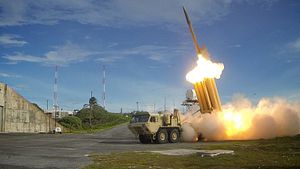The United States has hinted at an unprecedented shift in its policy toward North Korea by telling a key ally that it is ready to shoot down missiles test-fired by the Kim regime, according to Australian media reports.
Washington has briefed Australia on being “fully prepared” to intercept any ballistic missiles launched around North Korean founder Kim Il-sung’s birthday on April 15, Sydney’s Daily Telegraph reported Tuesday, citing anonymous intelligence sources. Under third-generation leader Kim Jong-un, who took over after the death of his father Kim Jong-il in 2011, Pyongyang has accelerated the testing of missiles and nuclear weapons in defiance of international sanctions. Following its fourth and fifth nuclear detonations within months of each other last year, the secretive country is anticipated to be on the verge of its sixth test.
The suggestion of a new strategy, while not independently confirmed, comes at a time of heightened tension between Washington and Pyongyang, which has threatened nuclear war following President Donald Trump’s decision over the weekend to send a U.S. carrier strike group to the waters off the Korean Peninsula.
On Tuesday, Trump, who has vowed not to let Pyongyang develop a ballistic missile capable of reaching the United States, said on Twitter he would “solve the problem” of North Korea with or without the help of China, the isolated state’s main ally and sponsor.
While U.S. officials have emphasized that military action would not be taken lightly, the Trump White House has raised the threat of force more than previous administrations.
In remarks that were widely interpreted as a warning to Pyongyang, Secretary of State Rex Tillerson said Sunday that Trump’s surprise missile strike against Syria last week was a signal that countries which violate international norms were likely to eventually meet a “response.”
Most military experts agree that military intervention against North Korea would risk full-scale war and massive casualties in the South Korean capital, whose close proximity to the North puts it within range of countless artillery batteries located along the border.
Although not seemingly as fraught as a strike on North Korean territory or a full-scale invasion, an attempted interception of a North Korean missile would not be without its dangers.
“If the U.S. attempted to intercept a missile it could either succeed or fail, with each outcome having different potential consequences,” Daniel Pinkston, a Troy University lecturer and former Korean linguist with the U.S. Air Force, told The Diplomat.
“Also, I think it depends on whether it is a space launch vehicle or a ballistic missile. If the interception were successful, then there would be concerns about the North Korean reaction. There is a risk that North Korea could respond with a kinetic attack somewhere. Or with some type of asymmetric response at a time and place of their choosing.”

































